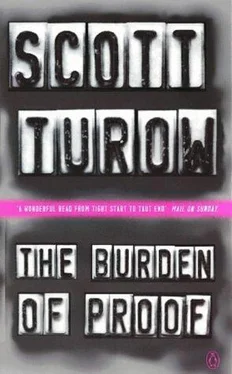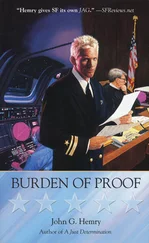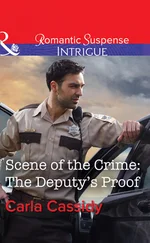Scott Turow - The Burden of Proof
Здесь есть возможность читать онлайн «Scott Turow - The Burden of Proof» весь текст электронной книги совершенно бесплатно (целиком полную версию без сокращений). В некоторых случаях можно слушать аудио, скачать через торрент в формате fb2 и присутствует краткое содержание. Жанр: Детектив, на английском языке. Описание произведения, (предисловие) а так же отзывы посетителей доступны на портале библиотеки ЛибКат.
- Название:The Burden of Proof
- Автор:
- Жанр:
- Год:неизвестен
- ISBN:нет данных
- Рейтинг книги:3 / 5. Голосов: 1
-
Избранное:Добавить в избранное
- Отзывы:
-
Ваша оценка:
- 60
- 1
- 2
- 3
- 4
- 5
The Burden of Proof: краткое содержание, описание и аннотация
Предлагаем к чтению аннотацию, описание, краткое содержание или предисловие (зависит от того, что написал сам автор книги «The Burden of Proof»). Если вы не нашли необходимую информацию о книге — напишите в комментариях, мы постараемся отыскать её.
The Burden of Proof — читать онлайн бесплатно полную книгу (весь текст) целиком
Ниже представлен текст книги, разбитый по страницам. Система сохранения места последней прочитанной страницы, позволяет с удобством читать онлайн бесплатно книгу «The Burden of Proof», без необходимости каждый раз заново искать на чём Вы остановились. Поставьте закладку, и сможете в любой момент перейти на страницу, на которой закончили чтение.
Интервал:
Закладка:
"All I knew was they said this was where we could find him." The agents, thwarted, had undoubtedly employed their usual techniques. A pretext call, as they referred to it."This is the Bank of Boston. We have a problem with a million-dollar wire transfer for Mr. Hartnell. Where can we find him?" The courts for decades had allowed the use of this kind of adolescent cunning.
"Hey," said Horn to his colleague, "shit happens." He took the subpoena without looking at Stern. Then Horn tapped the envelope. "-This guy'll be in your office Monday morning, nine sharp."
Stern applied both hands to the front door to close it behind the agents. Peter had drawn Marta away, but Dixon remained in the foyer. He had lit a cigarette and was grinning. "Got you fired up, didn't they?"
"How long have they been trying to serve you, Dixon?"
Dixon meditatively watched a plume of smoke drift away. He was always disturbed when Stern saw through him.
"Elise says men have been calling for a week or two. I didn't know what it was about," said Dixon. "Honestly., His mouth shifted as Stern looked at him. "I really wasn't sure. That's one of the things I've been meaning to talk with you about."
"Ah, Dixon," said Stern. It was unbelievable. A man who earned $2 million last year, who called himself a business leader, creeping down the back halls and thinking he could hide from the FBI. Stern put one foot on the stairwell, trying to focus on the enormous task at hand. He needed his coat. It was time, he told himself. Time. He was dizzy and faint at heart.
Family, he thought, with despair.
FOUR days after the funeral, Stern returned to the office.
He wore no tie, a means to signify that he was not formally present. He would look at the mall, answer questions. What was the term? Touch base. He had occupied this space for nearly a decade and had cultivated it with almost the same attention as his home. Small as it might be, this was Stern's empire, and there was inevitably some tonic effect in the electronic chatter of the telephones and business machines, the energetic movements of the dozen people he employed. Not, of course, today. The office, like everything else, seemed flattened, depleted, less color, less music. Entering through the back door, he stood by the desk of Claudia, his secretary, as he considered his lost universe. He looked for something hopeful in the mail.
"Mr. Hartnell is here."
The agents-, as promised, had arrived with the subpoena yesterday. Over the phone, Stern had dictated a letter to prosecutor Klonsky, stating that he represented Dixon and his company, and directing the government to contact Stern if it wanted to speak with anyone who worked for MD-a request the government would inevitably not follow. Then Stern had summoned Dixon for this meeting. His brother-inlaw waited in Stern's office, his feet on the sofa, the Tribune open before him, while he smoked one of Stern's cigars. His sport coat-double-breasted, with its many glittering buttons-had been tossed aside, and his thick forearms, still dark from an island vacation, were revealed. He rose and welcomed Stern to his own office.
"I made myself at home."
"Of course." Stern apologized for being late, then, removing his sport coat, surveyed. Given his trip to Chicago, it had been more than a week' since he had been here, but it all looked the same. He was not sure if he was comforted or horrified by the constancy. Stern's office was decorated in cream-colored tones. Clara had insisted on hiring someone's favorite interior decorator, and the result, Stern often thought, would have been more appropriate to the bedroom of some sophisticated adolescent. There was a sofa with plush pillows, pull-up chairs in the same nubby.beige material, and drapes to match. Behind his desk was an English cabinet of dark walnut-a recent addition and more Stern's taste but his desk was not a desk at all, rather four chromed standards topped by an inch-thick slab of smoky glass. Stern, years later, was still not accustomed to looking down and seeing the soft expanse of his lap. Now he was at liberty to refurnish. The thought came to him plainly. and he closed his eyes and made a small sound. He reached for a pad.
"What is this about, Dixon? Have you any idea?" Dixon shook his large head. "I'm really not sure." Dixon did not say he did not know. Only that he was not certain. Using the intercom, Stern asked Claudia to get Assistant United States Attorney Klonsky on the phone. She had left a number of phone messages, and Stern wanted to arrange an extension of the date when they would have to comply with her subpoena.
"We must answer certain questions at the threshold, Dixon.
What are they investigating? Who is it they seek to prosecute? Is it, in particular, you?"
"Do you think this thing's about me?"
"Probably," said Stern evenly.
Dixon did not flinch, but he took his cigar from his mouth and very carefully removed the ash. He finally made a sound, quiet and mininative.
"This is a subpoena duces tecum, Dixon-a request for records.
Ordinarily, the government would not send two agents to serve it. The prosecutors were attempting to deliver a message."
"They want to scare the shit out of me."
"As you would have it." Stern nodded. "I imagine they felt you would soon hear of the investigation. No doubt, had I not intervened, the agents would have sought to interrogate you while you were carrying on."
Dixon mulled. He was so full of himself that one seldom gave full credit to Dixon's subtlety. He studied people largely for his own advantage, but that did not mean he was not observant. Certainly, he was familiar enough with Stern's nuances to realize he was being told again that he had been a fool.
"How bad will this be?" Dixon asked.
"I think that you should not compare this with your prior encounters with the IRS and the CFTC." The Commodities Futures Trading Commission was the federal agency that regulated the futures industry, the equivalent of the SEC.
"They are bureaucrats and their first love is their own rules. Their minds do not run automatically to prosecution.
Federal grand juries sit to indict. This is a serious business, Dixon."
Dixon mugged up. There was a handsome, weathered look to his eyes.
"Can I ask a dumb question?"
"As many as you like," said Stern.
"What's a grand jury? Really, Besides something that's supposed to make you wet your shorts."
Stern nodded, more or less pleased that Dixon was taking things seriously enough to ask. The grand jury, he explained, was convened by the court to investigate possible federal crimes. In this case, the jurors gathered, by the court's order, every other week, alternating Tuesdays and Thursdays, for eighteen months. They were directed by the United States Attorney's Office, which, in the name of the grand jury, subpoenaed documents and witnesses to be examined at each session. The proceedings were secret. Only the witnesses who testified could reveal what happened. If they chose to. Few individuals, of course, wished to trumpet the fact that they had been haled before a federal grand jury.
"And what kind of chance do I stand with them?" asked Dixon. "This grand jury."
"Very little. Not if the prosecutor decides to indict. It is the U.S.
Attorney's Office we must persuade. Inside the grand jury room, the burden of proof on the government is minimal-ey need merely convince a bare majority of the jurors that here is probable cause to believe a crime has taken place. The prosecutors may introduce hearsay, and the target and his lawyer. have no right to learn. what has taken place or to offer any refutation. It is not what you would describe as evenhanded."
"I'd say," answered Dixon. "Whose idea was this?".
"The framers of the Constitution of the United States," answered Stern.
Читать дальшеИнтервал:
Закладка:
Похожие книги на «The Burden of Proof»
Представляем Вашему вниманию похожие книги на «The Burden of Proof» списком для выбора. Мы отобрали схожую по названию и смыслу литературу в надежде предоставить читателям больше вариантов отыскать новые, интересные, ещё непрочитанные произведения.
Обсуждение, отзывы о книге «The Burden of Proof» и просто собственные мнения читателей. Оставьте ваши комментарии, напишите, что Вы думаете о произведении, его смысле или главных героях. Укажите что конкретно понравилось, а что нет, и почему Вы так считаете.












